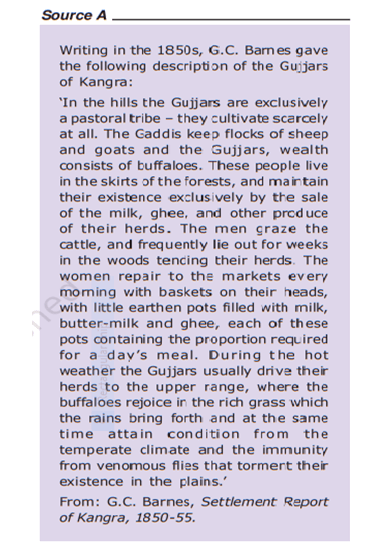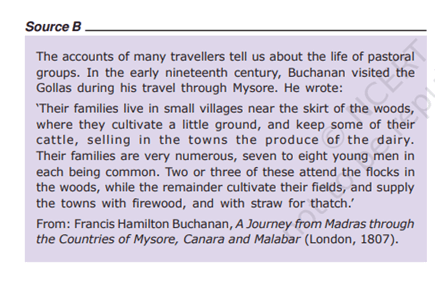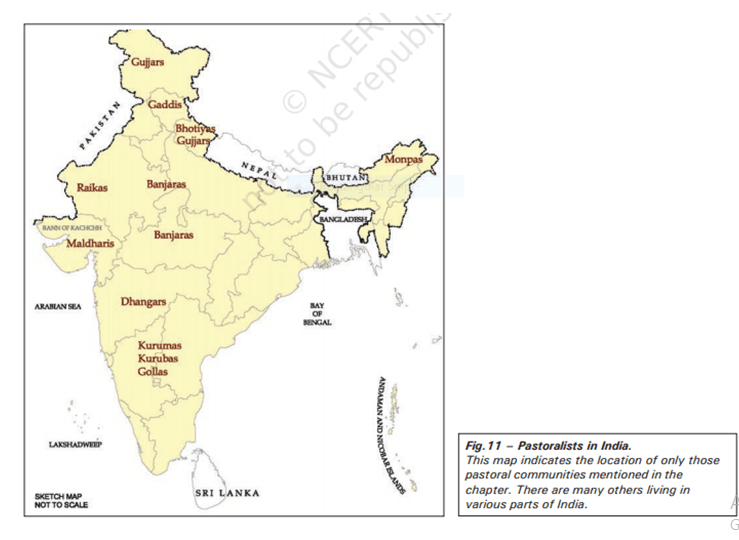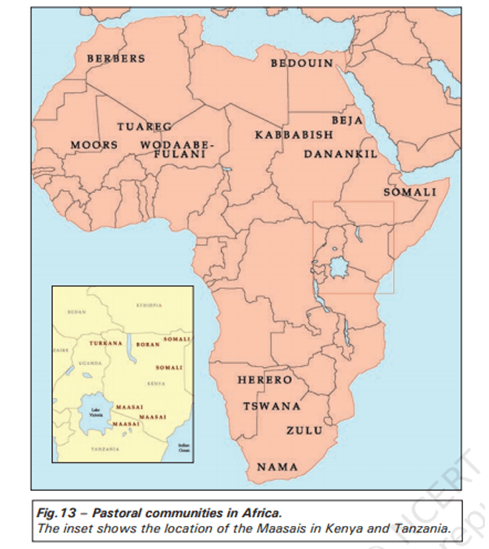History - Class 9
Our Past - I
Chapter 5: Pastoralists in the Modern World
Activity: 1
Question: Read Sources A and B.
- Write briefly about what they tell you about the nature of the work undertaken by men and women in pastoral households.
- Why do you think pastoral groups often live on the edges of forests?


Answer:
- Write briefly about what they tell you about the nature of the work undertaken by men and women in pastoral households.
In the case of the pastoralists of the hills, the Gaddis and the Gujjars, the men used to graze the cattle, sheep or goats and remained away from the home for many days. The women used to sell the milk products like milk, butter-milk and ghee in the local marketplace every day. Regarding the Gollas in Mysore, besides being pastoralists, they were also cultivating land. So some men were taking out the cattle for grazing while some men cultivated the fields.
- Why do you think pastoral groups often live on the edges of forests?
Pastoral groups often lived near the edges of forests so that they could graze their flocks of animals in the forest as well as cultivate fields next to the forest area. They were selling the milk and milk products from the animals in the local market and also cultivating land for their requirements of food. By living on the edge of forests, both of these activities were conveniently handled.
Activity: 2
Question: Write a comment on the closure of the forests to grazing from the standpoint of:
- a forester
- a pastoralist
Answer:
- A Forester:
Since a forester’s duty is to ensure the conservation of forests, it is good that the forests have been closed for grazing. This will ensure proper growth of the vegetation and trees, so that the forest wealth will be maintained. - A Pastoralist:
Earlier our animals were grazing in the forest area, where vegetation was plentiful. Now, since the closure of forests for grazing, our animals have to be taken far away to find grass and vegetation for food. This has put us to a lot of inconvenience, as managing our flock has become more difficult.
Activity: 3
Imagine you are living in the 1890s. You belong to a community of nomadic pastoralists and craftsmen. You learn that the Government has declared your community as a Criminal Tribe.
Question 1. Describe briefly what you would have felt and done.
Answer: I feel that declaring my tribe as criminal just because we move from place to place is totally wrong and unjust. We are not committing any crime by grazing-herds. For our herds to graze, moving from place to place is required when fodder at one place gels finished. I will write a petition to the District Collector to remove our tribe’s name from the list of Criminal Tribes.
Question 2. Write a petition to the local collector explaining why the Act is unjust and how it will affect your life.
Answer:
Petition to Collector
Sir,
I request you to remove my tribe’s name from the list of Criminal Tribes, as we are not committing any crime by grazing our herds at different places. We are not criminals, as we do not commit theft or kill anyone; we are just earning our living by selling the milk and milk products of our animals. So the Act is totally unjust and it should not be enforced.
In fact, I am suffering great hardship, as I am limited to a very small area and when the vegetation there is finished, I have to take a special permission to go elsewhere for my animals to feed. Also the policemen harass us for bribes when we go elsewhere, which causes us further hardship. So you are requested to remove my tribe’s name from the list of criminal tribes.
Thanking, you sirActivity: 4
Question 1. Imagine that it is 1950 and you are a 60-year-old Raika herder living in post-Independence India. You are telling your grand-daughter about the changes which have taken place in your lifestyle after Independence. What would you say?
Answer: Since the coming of independence, my life has changed quite a bit. Since now there is not enough pasture for our animals, we had to reduce the number of the animals we keep. We have changed our grazing grounds also, as those on the banks of the River Indus have gone into Pakistan and we are not allowed to go there. So, we have found alternative grazing grounds in Haryana, where our herds go when the harvest has been cut.
At this time they can feed on the stumps of the plants remaining and also fertilize the soil with manure from their excreta. Your father did not like a herder’s life and so he decided to become a farmer. I gave him my savings to buy some land and now he is cultivating food grains. I think you will have a much better life than what we had.
Question 2. Imagine that you have been asked by a famous magazine to write an article about the life and customs of the Maasai in pre-colonial Africa. Write the article, giving it an interesting title.
Answer: Peculiarities of Maasai Culture:
The word Maasai means My People (‘Maa’ means My and ‘sai’ means people, in their language). They are traditionally nomadic and pastoral people. The males in their society are divided into two parts – Elders and Warriors. The elders belong to the higher age group and decide on the affairs of the community by meeting as a group and also settle disputes.
The Warriors are the younger group who are responsible for the protection of the tribe. They also organize cattle raids when required. Since cattle are their wealth, these raids assume importance, as in this way they are able to assert their power over other pastoral groups. However, the Warriors are subject to the authority of the Elders.Question 3. Find out more about the some of the pastoral communities marked in Figs. 11 and 13.


Answer:
Figure 11 (Indian Tribes)
Maldbaris:They are nomadic tribal herdsmen who live in the Gujarat state of India. The literal meaning of Maldhari is ‘owner of animal stock’. They are notable as the traditional dairymen of the region and once supplied milk and cheese to the palaces of raja.
Monpas:Monpas live in Arunachal Pradesh. They are also one of the 56 officially recognised ethnic groups in China. Their language belongs to the Tibeto-Burman family and is written in Tibetan script. There are six sub-groups of Monpas. They adopted Tibetan Buddhism.
Figure 13 (African Tribes)
Nama Tribe:They are an African ethnic group of South Africa, Namibia and Botswana. In general, the Nama practice a policy of communal land ownership. The Nama have a culture that is rich in the musical and literary abilities of its people. Traditional music, folk tales, proverbs and praise poetry have been handed down for generations and form the base for much of their culture. They are also known for "handicrafts” like leather work, jewellery, clay pots, etc.
Zulu Tribe:The Zulu tribes are the largest South-African ethnic group, with an estimated 10-11 million people. Their language ‘Zulu’ is a Bantu language. Under apartheid, they were classed as third class citizens and suffered from state-sanctioned discrimination. But now, they are enjoying equal rights along with all other citizens. Most Zulu people are Christian.
Questions
Question 1. Explain why nomadic tribes need to move from one place to another. What are the advantages to the environment of this continuous movement?
Answer: Nomadic tribes have to move from place to place to earn their living and to find pastures for their animals. All of them had to adjust to seasonal changes and make effective use of available pastures in different places. When the pasture was exhausted or unusable in one place, they moved their herds and flocks to new areas.
This continuous movement was advantageous to their environment.
- The pastoral movements allowed time for the natural restoration of vegetation growth.
- The flocks manured the fields.
Question 2. Discuss why the colonial government in India brought in the following laws. In each case, explain how the laws changed the lives of pastoralists- Waste Land Rules, Forest Acts, Criminal Tribes Act, Grazing Tax.
Answer:
Waste Land Rules: To colonial officials all uncultivated land was unproductive, it produced neither revenue nor agricultural produce. It was considered as a wasteland, which had to be brought under the plough. Wasteland rules were enacted in the mid-19th century in many parts of the country. By these rules uncultivated land was taken over and given to select individuals. In most places, the land taken over was the grazing tracts used by the pastoralists. So the expansion of cultivation meant less pastures for the animals.
Forest Acts:
In the mid-19th century various Forest Acts were enacted in different provinces. Through these Acts forests were divided into Reserved Forests and Protected Forests. The pastoralists had no access to the Reserved Forests. In the Protected Forests, some grazing rights were given to the pastoralists but their movement was restricted. The colonial officials believed that grazing destroyed the saplings and flocks munched away the shoots.
The Forest Acts changed the lives of the pastoralists. They were prevented from entering many forests that had earlier provided good pastures. The pastoralists now needed a permit for entry. It specified the period during which they could stay in the forest. If they overstayed, they were fined. They had to leave the forest, even when forage was available.
Criminal Tribes Act 1871:
The colonial government wanted to rule over a settled population. They wanted them to live in fixed places, with fixed rights on particular fields. Such a population could be ruled easily. Settled population was seen as peace loving and law abiding. The colonial people were suspicious of nomadic and pastoral tribes, who moved from place to place and hawkeld their goods. They had no fixed place of residence and moved every season to find pasture for the animals.
In 1871, the colonial government passed the Criminal Tribes Act. According to this Act many communities of pastoralists, craftsmen and traders were classified as Criminal Tribes. These communities had to live only in notified village settlements. They were not allowed to move out without a permit. The police kept a continuous watch on these people.
Grazing Tax: The aim of the colonial government was to collect as much revenue as possible, so tax was imposed on land, water, salt, trade goods and animals. By 1880, each pastoralist was given a pass. Each cattle herder had to pay tax for each cattle head. The amount paid was entered on the pass.
Question 3. Give reasons to explain why the Maasai community lost their grazing lands.
Answer: The Maasai community lost their grazing lands because:
- Before colonial times, Maasailand stretched over vast area from north Kenya to the steppes of northern Tanzania. In the late 19th century, the European powers scrambled for territorial possessions in Africa. Africa was soon divided between the European powers. In 1885, Maasailand was cut into half with an international boundary between British Kenya and German Tanganyika.
- The best grazing lands were gradually taken over for White settlement. The Maasai remained in a small area. The Maasai lost 60 per cent of their pre-colonial lands. They were pushed to arid land with little rainfall and poor pastures.
- From the late 19th century, British colonial government in east Africa encouraged the peasants to expand cultivation. As a result pasturelands were converted into cultivated lands.
- Large areas of grazing maasai land was converted into game reserves like Maasai Mara and Samburu National Park in Kenya and Serengeti Park in Tanzania. Pastoratists could not enter the reserves. They could neither graze their animals nor hunt animals.
Question 4. There are similarities in the way in which the modern world forced changes in the lives of pastoral communities in India and East Africa. Write about any two examples of changes which were similar for Indian pastoralists and the Maasai herders.
Answer: The problems faced by the Indian pastoralists due to the enforcement of the Wasteland Rules were similar to the problem faced by the Maasai community in Africa. The British Colonial government in East Africa encouraged the local peasant communities to expand cultivation. Pasturelands were turned into cultivated fields and the Maasai community lost its grazing fields.
Similarly, under the Wasteland Rules, pastoral land was taken from the pastoralists and given to local individuals who in turn brought the land under cultivation. The Maasais and the Indian pastoralists lost their grazing grounds.
Yet another problem faced by the Maasais and the Indian pastoralists was the restriction that was imposed on them by the colonist. The Indian Forest Acts restricted the Indian pastoralist from entering the reserved forests which were rich in pasture. Similarly, the colonist in East Africa converted grazing land into Game Reserves.
The pastoralists were not allowed to enter these Reserves. The pastoral communities in India and East Africa had to endure many hardships as the demands of the modern world grew increasingly.